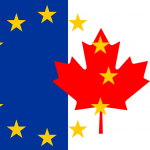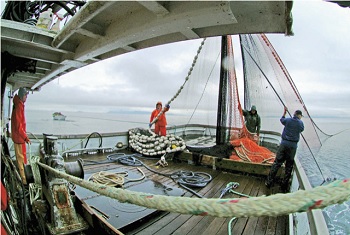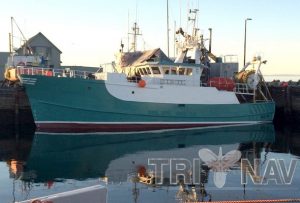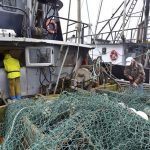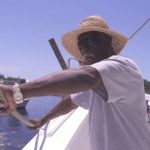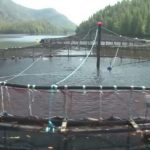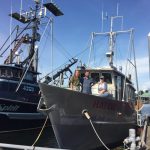Tag Archives: new regulations
Unalaska, Aleutians East Borough oppose Rep. Peltola’s proposed trawling limitations
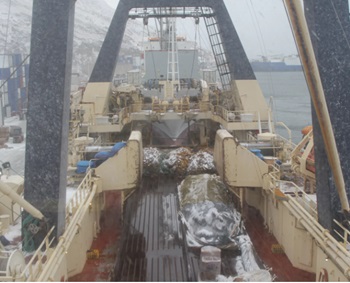 Communities in the Aleutians are pushing back against proposed legislation that would bring stricter regulations to the Bering Sea trawl fishery. The City of Unalaska and the Aleutians East Borough are among 53 organizations that signed onto a letter sent to U.S. Rep. Mary Peltola, urging her to withdraw H.R. 8507, a bill she sponsored in May. The proposed legislation aims to add new regulations to where trawling can take place across the United States, not only in Alaska. Trade organizations and some coastal communities whose economies rely on trawl fisheries have pushed back against the bill, asking the congresswoman to repeal it. “If enacted, H.R. 8507 would directly harm fishermen and coastal communities in Alaska and throughout our nation, along with countless other people who rely on a healthy domestic seafood sector for food, jobs, and their way of life,” the letter said. more, >>CLICK TO READ<< 13:28
Communities in the Aleutians are pushing back against proposed legislation that would bring stricter regulations to the Bering Sea trawl fishery. The City of Unalaska and the Aleutians East Borough are among 53 organizations that signed onto a letter sent to U.S. Rep. Mary Peltola, urging her to withdraw H.R. 8507, a bill she sponsored in May. The proposed legislation aims to add new regulations to where trawling can take place across the United States, not only in Alaska. Trade organizations and some coastal communities whose economies rely on trawl fisheries have pushed back against the bill, asking the congresswoman to repeal it. “If enacted, H.R. 8507 would directly harm fishermen and coastal communities in Alaska and throughout our nation, along with countless other people who rely on a healthy domestic seafood sector for food, jobs, and their way of life,” the letter said. more, >>CLICK TO READ<< 13:28
New regulations aim to protect Florida’s stone crab population
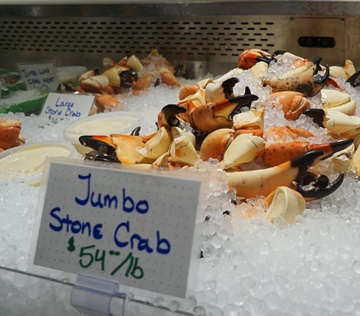 For Floridians, October has one more holiday than what might be on most calendars: the start of stone crab season. Starting Oct. 15, recreational and commercial fishermen are able to harvest the species that holds a spot as one of the five most important fisheries in Florida, according to the Florida Fish and Wildlife Conservation Commission. Although stone crabs are found from North Carolina to Belize, 99% of the stone crab harvest for the entire United States come from Florida. And this year, the FWC began implementing new regulations in an effort to conserve the longevity of this important fishery. >>click to read<< 08:29
For Floridians, October has one more holiday than what might be on most calendars: the start of stone crab season. Starting Oct. 15, recreational and commercial fishermen are able to harvest the species that holds a spot as one of the five most important fisheries in Florida, according to the Florida Fish and Wildlife Conservation Commission. Although stone crabs are found from North Carolina to Belize, 99% of the stone crab harvest for the entire United States come from Florida. And this year, the FWC began implementing new regulations in an effort to conserve the longevity of this important fishery. >>click to read<< 08:29
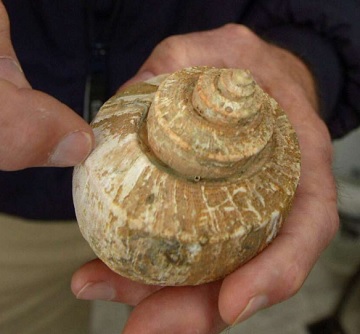
Falling prices, new regulations leave Connecticut’s whelk fisherman in a pinch
Squeezed by both falling prices and increased regulations, whelk fishermen in Long Island Sound say their industry is facing one of the hardest summers in recent memory. Driven largely by overseas demand, many fishermen turned their attention toward the once-ignored whelk as it became harder to make a living off of lobster and other declining fisheries. After watching the price of whelk soar last year, however, fishermen say the Asian market for the snails has largely dried up, sending prices crashing. Brian Matias, a boat captain who works out of Bridgeport, said he now gets half the price for whelk as he did over the winter, forcing fishermen like him to work longer hours at sea to increase their catch. >click to read< 10:53
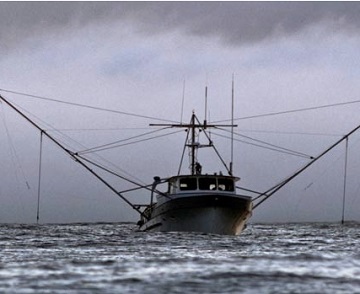
New Regulations: Commercial troll salmon season
The National Marine Fisheries Service (NMFS) in consultation with the Pacific Fishery Management Council (PFMC), the State of Oregon, the State of Washington, and fishery representatives met today via conference call and have taken the following in-season management action related to the commercial troll salmon season from the US/Canada border to Cape Falcon: Action taken,Modified the landing limit and possession limit in the area between the Queets River and Leadbetter Point from 150 to 200 Chinook per vessel per landing week (Thursday-Wednesday) from May 25 to June 21, and for the period of June 22-29 (Note that this is also the weekly maximum for all open areas combined). more, >click to read< 13:38

Maine’s politicians seek delay on whale protection rules
In a letter to Commerce Secretary Gina Riamondo, Gov. Mills and other officials urge federal fisheries regulators to extend the May 1 deadline to comply with the new regulations, which are aimed at protecting critically endangered north Atlantic right whales by setting a seasonal closure and requiring modifications to gear. They are requesting a July 1 deadline. The state’s commercial fishing industry is working “in good faith” to comply with the new rules but are facing supply chain issues and other complications with less than six weeks to go until implementation of the new rules. >click to read< 17:40

The Maine lobster fishery is coming off a record year, faces challenges ahead
Maine’s lobster fishery scored a record-breaking value in 2021, with a 75% increase over 2020 and a 10% increase in landed weight. But fishermen face increasing pressures, including difficulty finding and keeping crew, rising operational costs, competition for fishing grounds from other industries, new regulations affecting fishing gear and methods and coastal development pressure that’s squeezing waterfront access and opportunities to live they work. >click to read< 09:25

Lobster industry needs more time to meet new regulations
Not only is the fishery being forced to change based on insufficient evidence regarding whale entanglements, it is being forced to do so on a schedule that is both too tight and poorly timed. That has left lobstermen scrambling to meet the May 1 deadline for using special weakened rope, rope that is in short supply, if it can be found at all. The Biden administration should see that the industry can’t make this deadline without causing harm. It should be extended to a more reasonable date. Under the new rules, lobster boats must use new weakened rope, or special inserts that are designed to weaken the existing rope, depending on where they fish. >click to read< 10:03

Catch-App: “Government are going to make us criminals,” fear English fishermen
English fishermen are deeply concerned that new regulations regarding the enforcement of Catch-App will turn them into criminals. Fishermen across England are deeply concerned as the Marine Management Organisation (MMO) the Government’s fishing regulator in England, sets the date of 28 February 2022 for the enforcement stage of the Catch-App which could leave them facing prosecutions they cannot avoid. Leading fisheries solicitor Andrew Oliver, partner of Hull based firm Andrew Jackson questioned the legal implications of the regulations. “This is a clear breach of human rights. It is against public law principles to create a criminal offence for which it is impossible to comply with. >click to read< 07:06
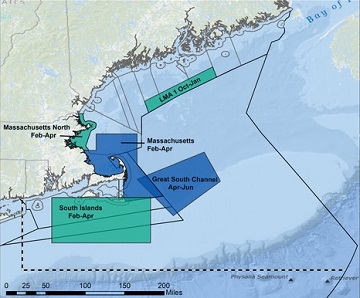
Published Today: New Regulations for Northeast Lobster and Jonah Crab Trap/Pot Fishery
Changes to Seasonal Restricted Areas Begin October 18, 2021; All Other Changes Effective May 1, 2022. The final rule to Amend the Atlantic Large Whale Take Reduction Plan to Reduce Risk of Serious Injury and Mortality to North Atlantic Right Whales Caused by Entanglement in Northeast Crab and Lobster Trap/Pot Fisheries announced on August 31 published in the Federal Register this morning. Some measures within the rule go into effect 30 days after today’s publication. The changes to seasonal restricted areas to allow fishing without persistent buoy lines will go into effect on October 18, 2021. In addition, there are changes to restricted areas below: >click to read<14:35
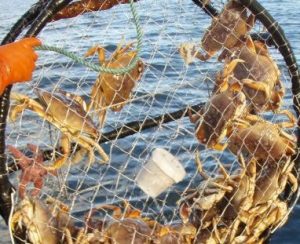
California: New regulations shut down Commercial Dungeness Crab season early
After a particularly hard start to the season, commercial Dungeness crab fisheries closed several weeks early on June 1. June 7 marked the start of the Lost and Abandoned Gear Program, which incentivizes retrieving and turning in leftover fishing gear. Both the closure and the gear removal program aim to protect migrating humpback whales and other marine life from getting tangled in fishing equipment. The Center for Biological Diversity sued the California Department of Fish and Wildlife (CDFW) after a fishing season with 71 whale entanglements in 2016. New regulations imposed after the settlement allow officials to shut down the season when the risk of whale or leatherback sea turtle entanglements is high. >click to read< 17:37
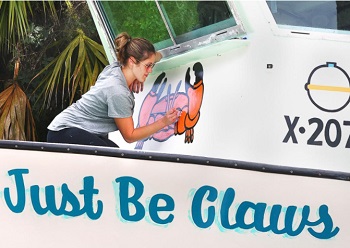
Stone crab season opens Oct. 15 with new regulations in place
For roughly a week now, armadas of Floridian crabbing fleets and their deckhands have boated miles offshore into the Gulf of Mexico and the Atlantic Ocean to lay their traps on the depths. Come Thursday, Oct. 15, 2020, these crabbers will venture out again to launch Florida’s stone crab season, hauling in anticipated bounties of Menippe mercenaria and their treasured claws. “We’re putting them out right now,” Richard Stiglitz, owner of the Homosassa-based Salty Bones Fisheries, said about 650 of his 10,000 traps. It’ll take some time before crabbing crews know what kind of season they’ll have. >click to read< 10:05
Shrimpers, Crabbers Learn New Regulations at Louisiana Fisheries Meeting
 Shrimpers and crabbers learned about the newest regulations, techniques and equipment at a Louisiana Fisheries Forward meeting on March 24, organized by the LSU AgCenter and Louisiana Sea Grant. Thu Bui, LSU AgCenter and Louisiana Sea Grant fisheries agent, said the meetings are intended to help fishers learn about new developments before their peak seasons get underway soon. “It makes them more professional and gives them the information so they can become more profitable,” Read the rest here 09:55
Shrimpers and crabbers learned about the newest regulations, techniques and equipment at a Louisiana Fisheries Forward meeting on March 24, organized by the LSU AgCenter and Louisiana Sea Grant. Thu Bui, LSU AgCenter and Louisiana Sea Grant fisheries agent, said the meetings are intended to help fishers learn about new developments before their peak seasons get underway soon. “It makes them more professional and gives them the information so they can become more profitable,” Read the rest here 09:55
New Bedford: New regulations affecting scallop catch, industry leaders say
 This year’s scallop catch is expected to come in lower than in previous thanks to the tightening of catch limits, local industry leaders say. Jim Kendall of New Bedford Seafood Consulting said things are looking good from a sustainability perspective, thanks to measures aimed at leaving younger scallops in place. Read the rest here 09:43
This year’s scallop catch is expected to come in lower than in previous thanks to the tightening of catch limits, local industry leaders say. Jim Kendall of New Bedford Seafood Consulting said things are looking good from a sustainability perspective, thanks to measures aimed at leaving younger scallops in place. Read the rest here 09:43
Pictou fish plant depends on foreign workers program, says owner
 Paul Logan can’t get enough local workers in Pictou County to operate his fish processing business. “It’s just not the type of work they want to do in Pictou County,” the owner of North Nova Seafoods said in an interview Monday. Read more here 07:59
Paul Logan can’t get enough local workers in Pictou County to operate his fish processing business. “It’s just not the type of work they want to do in Pictou County,” the owner of North Nova Seafoods said in an interview Monday. Read more here 07:59



































